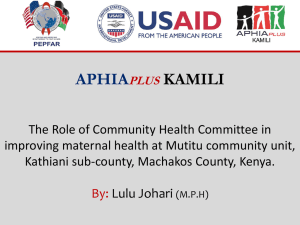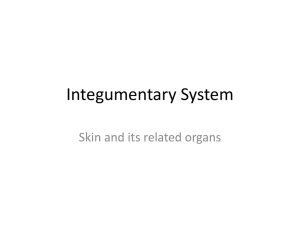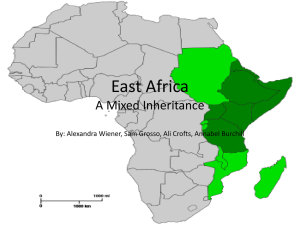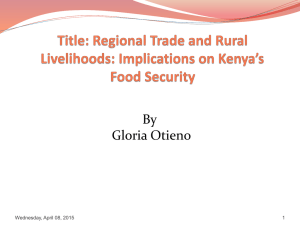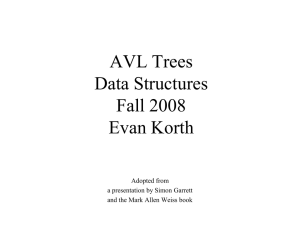GENDER IMBALANCE IN THE ENGINEERING SECTOR and the
advertisement
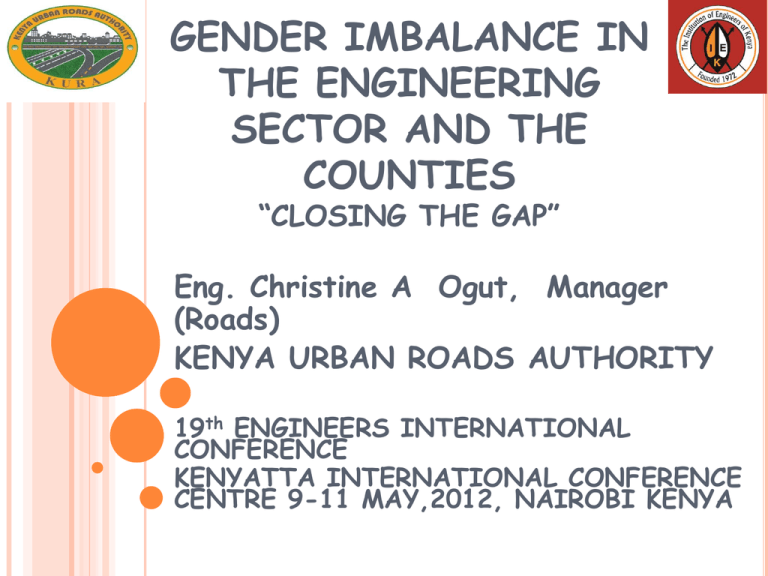
GENDER IMBALANCE IN THE ENGINEERING SECTOR AND THE COUNTIES “CLOSING THE GAP” Eng. Christine A Ogut, Manager (Roads) KENYA URBAN ROADS AUTHORITY 19th ENGINEERS INTERNATIONAL CONFERENCE KENYATTA INTERNATIONAL CONFERENCE CENTRE 9-11 MAY,2012, NAIROBI KENYA PRESENTATION OUTLINE Background Gender imbalance in Engineering Statistics in Engineering Why Gender Imbalance What has been done in Kenya Opportunities Closing the Gap BACKGROUND Gender refers to socially determined power relations, roles, responsibilities and entitlements for men and women; girls and boys Commitment by Kenya Government to promote gender balance in both political and social realms Implementation NARC manifesto, 33% representation of women in all sectors & particularly in decision making positions BACKGROUND Gender is about giving people equal opportunity Commitment by Kenya Government to promote gender balance in both political and social realms At county level – Not more than twothirds of any County Assembly or County Executive shall be of the same gender Gender disparity limits women's participation in national development processes at various levels BACKGROUND Women constitute 50.3% of Kenyan population Our Gender concern is about Gender imbalance in Engineering- where are the women in this male dominated field? This presentation is to sensitize the conference participants on the Gap in Gender in engineering Provide an overview on gender imbalance in engineering supported by statistics Harness the opportunity to share this challenge and provide a paradigm shift through our collective action STATISTICS IN KENYA Women constitute 50.3% of Kenyan population Last year KSCE candidates ratio 229,171 (55.65% ) boys: 159,380 (44.35%) girls Last year KSCE results ratio C+ & above (25%) 60,200 (61.98% ) boys: 36,934 (38.02%) girls Male students: 63 points. Female students: 61 points. 42,000 qualify for university places in public universities Minimum cut off for engineering B- ( Maths, Physics ,Chemistry) STATISTICS IN ENGINEERING ENGINEERS REGISTRATION BOARD CATEGORY GENDER MALE TOTAL FEMALE Reg. Consulting Engineers 272 (98.2%) 5 (1.8%) 277 Registered Engineers 1298 (96.8%) 43 (3.2%) 1341 Reg. Graduate Engineers 4974 (92.3%) 413 (7.7%) 5387 Graduate Technicians 1128 (98.5%) 17 (1.5%) 1145 INSTITUTION OF ENGINEERS OF KENYA CATEGORY GENDER TOTAL MALE FEMALE Fellows 81 (98.8%) 1 (1.2%) 82 Corporate Engineers 1465 (98.6%) 21 (1.4%) 1486 Associates 99 (100%) 0 99 Graduates 1569 (96.6%) 55 (3.4%) 1624 GENDER IMBALANCE IN ENGINEERING Country Latvia %of Female engineering professionals 30% Bulgaria 29.3% Cyprus 28.6% Sweden 25.9% Turkey 21.0% Italy 19.5% Ireland 14.3% Austria 10.0% United Kingdom 8.7% Source: UK Resource Centre’s analysis of the European Labour Force Survey (2007) Statistics tell it all. Not only in Kenya but world wide concern Girls are effectively ruling themselves out of a degree in Engineering by the Age of 14 UK has the lowest proportion of female professionals in EU states Factors causing Gender Imbalance include Education, Teachers Attitudes, career information, advice GENDER IMBALANCE IN ENGINEERING Country- Kenya %of Female engineering professionals IEK Membership 2.41 ERB Membership 6.58 University students 20 Kenya Urban Roads Authority 10 City Council of Nairobi 0% A look at the Kenyan Context Not much has been done as provided by statistics UK has the lowest proportion of female professionals in EU states Factors causing Gender Imbalance include Education, Teachers Attitudes, career information, 9 advice WHY GENDER IMBALANCE ? Historical patterns of institutionalized gender discrimination play a key role Low performance of girls in Maths, science & technical subjects hinders them from joining Engineering at University level Poor attitude amongst female students on science subjects Career decisions on subject choices made at an early age without students knowing the impact 10 WHY GENDER IMBALANCE ? Engineering has relatively low standing in the country and therefore may not be attractive to women Lack of interest in science subjects ( Maths, Physics and Chemistry) by most female students Heavy responsibility yet low returns i.e. an architect would get 6% of the project cost and an engineer 3% yet when the project fails the Engineer is punished Advocacy agents missing to encourage women into the profession Not much is being done to bridge the gap in Gender imbalance in Engineering at all levels 11 WHY GENDER IMBALANCE? Lack of career counselor to guide them through the process Also lack of female role models to demonstrate a successful career in Engineering. Misconception that engineering is about spanners – there are soft component of engineering that are not known to the young and potential students WHAT HAS BEEN DONE IN KENYA Gender policy in Education 2007 The new constitution of Kenya 2010 is a starting point Several initiatives targeting women Scientist and Engineers are in place WEGSA - Women Engineers and Girl Scientists in Africa initiative with UNESCO YWSEAfrica – Young Women Scientists and Engineers in Africa by STEMAfrica: which provides role models for Young Women Engineers. It holds regular forums, provides information and sends women on attachment. Career counseling student women Engineers 13 OPPORTUNITIES Bottom up approach in advocacy for engineering. Advance the advocacy agenda by engaging Government, Educators and stakeholders Mathematics is a compulsory subject. How can we make other science subjects attractive Government available at partnership level to improve curriculum Innovation and incentives to attract young female students into Engineering Showcase more women Engineers to act as role models 14 OPPORTUNITIES Environment provided by the new constitution of Kenya to be exploited. Implement the requirement of constitution of Kenya 2010 on Gender Pilot projects to motivate female students at National Schools and Provincial schools into the Engineering field Set up and effectively utilize mentoring programmes Introduce Engineering Clubs in schools for Girls 15 OPPORTUNITIES Strengthen of IEK and ERB Governance Structure to establish a committee on women advisory and advocacy in Engineering that will work towards encouraging women into the profession Promote the diversity of engineering careers available Experiences from other countries which have put in place strategies to address Gender imbalance in Engineering Undertake attitudinal Research on the Kenyan Case 16 CLOSING THE GAP Closing the Gap in Gender Imbalance in Engineering can be achieved through Multi- pronged approaches IEK and ERB will require to put in place structures and set aside budget to facilitate redress of Gender imbalance in Engineering Sensitize top decision makers Enhance stakeholder sensitization & capacity Building to support women in Engineering Ensure gender balance in appointments in governance & leadership Implement affirmative action in provision of scholarships 17 CLOSING THE GAP Closing the Gap in Gender Imbalance in Engineering can be achieved through Multi- pronged approaches IEK and ERB will require to put in place structures and set aside budget to facilitate redress of Gender imbalance in Engineering Together we can, it begins with me and continues with you. Let us contribute towards closing the Gap in Gender imbalance in Engineering. 18 THE END 19 Thank you… any questions or comments?

